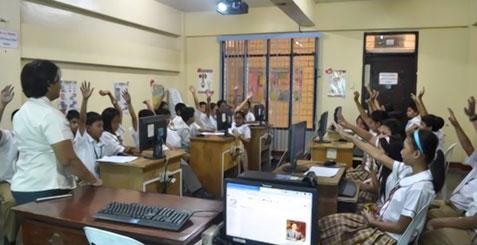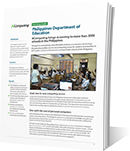CASO DE ÉXITO
NComputing brings eLearning to more than 3000 schools in the Philippines
Through its revolutionary and affordable desktop virtualization technology, NComputing enables one-to-one computing access for students and teachers in 3077 public schools and technical-vocational high schools of the Philippines.

Goal: one-to-one computing access
As part of its Computerization Project, the Philippines Department of Education wanted to modernize the learning environment in its public schools nationwide. To achieve this goal, the department initiated a bidding process to evaluate the best and most economical solution to set up low-cost and energy-efficient computer labs and classrooms. The department also aimed to find a solution that would be ideal to maintain for schools in rural and remote parts of the country.
One-sixth the cost of personal computers
After evaluating various solutions, the Department of Education chose NComputing’s revolutionary shared computing solution. The Philippines rolled out a combination of the X350, a kit with three thin client access devices that connect via a PCI slot, and the U170, which provides a USB port to enable connection to the shared PC.
Through its local distributor MustardSeed Corp., NComputing and provincial partners deployed the access devices in 3,077 schools nationwide: 1,642 public elementary schools in Luzon, 1,194 in Visayas and Mindanao, and 240 technical-vocational high schools. Since all NComputing devices offer plug-and-play functionality, the entire deployment was complete in just six months. The department implemented a total of 29,400 thin client access devices with 5,000 host PCs. Each access device cost PHP 4,000, around one-sixth the cost of a regular PC.
Technology at a huge savings
In most of the Philippines public school labs, the NComputing devices have enabled one host system (CPU) to power six workstations simultaneously. Instead of five PCs, the schools only need one for every six users.
By reducing the number of PCs required, NComputing’s virtualization technology helped cut down hardware costs significantly, as well as lower the maintenance and electric power consumption costs to a fraction of what they would be otherwise.
Apart from upfront hardware savings, the NComputing solution delivers additional benefits for the country’s school system:
- 90 percent less power consumption: The access devices use as little as 1 watt of electricity each, so a system of one host PC with 10 access devices attached to it consumes only around 550 watts total, as opposed to 5,500 watts consumed by 11 computers.
- Up to 75 percent fewer operational issues: With fewer PCs, schools reduce the number of maintenance issues. If a host PC breaks down, a school can just move the access devices to another PC while the broken one is being repaired – meaning end users experience no down time. When it’s time to upgrade, it’s a smaller number of host computers.
eLearning for more Filipino children
The NComputing-powered e-classrooms have completely changed the teaching-learning environment in the public schools of the Philippines. The new digital learning centers have paved the way for a more pleasant, interactive and engaging experience for both teachers and students. Schools and the Department of Education are happy with the result.
“They are overwhelmed by it,” said MustardSeed’s Judith Adao about how the teachers and students received the new computers.
“We are proud that NComputing’s technology has contributed to the modernization of the IT educational infrastructure in thousands of schools in Philippines,” said Manish Sharma, NComputing’s Vice President for Asia Pacific. “NComputing is highly confident that the technology will enable more Filipino children to take advantage of computer education and have a much better environment than before. We are also confident that our track record with other educational institutions around Asia Pacific would prove that we are the solution of choice for academia.”
Suggested reading




